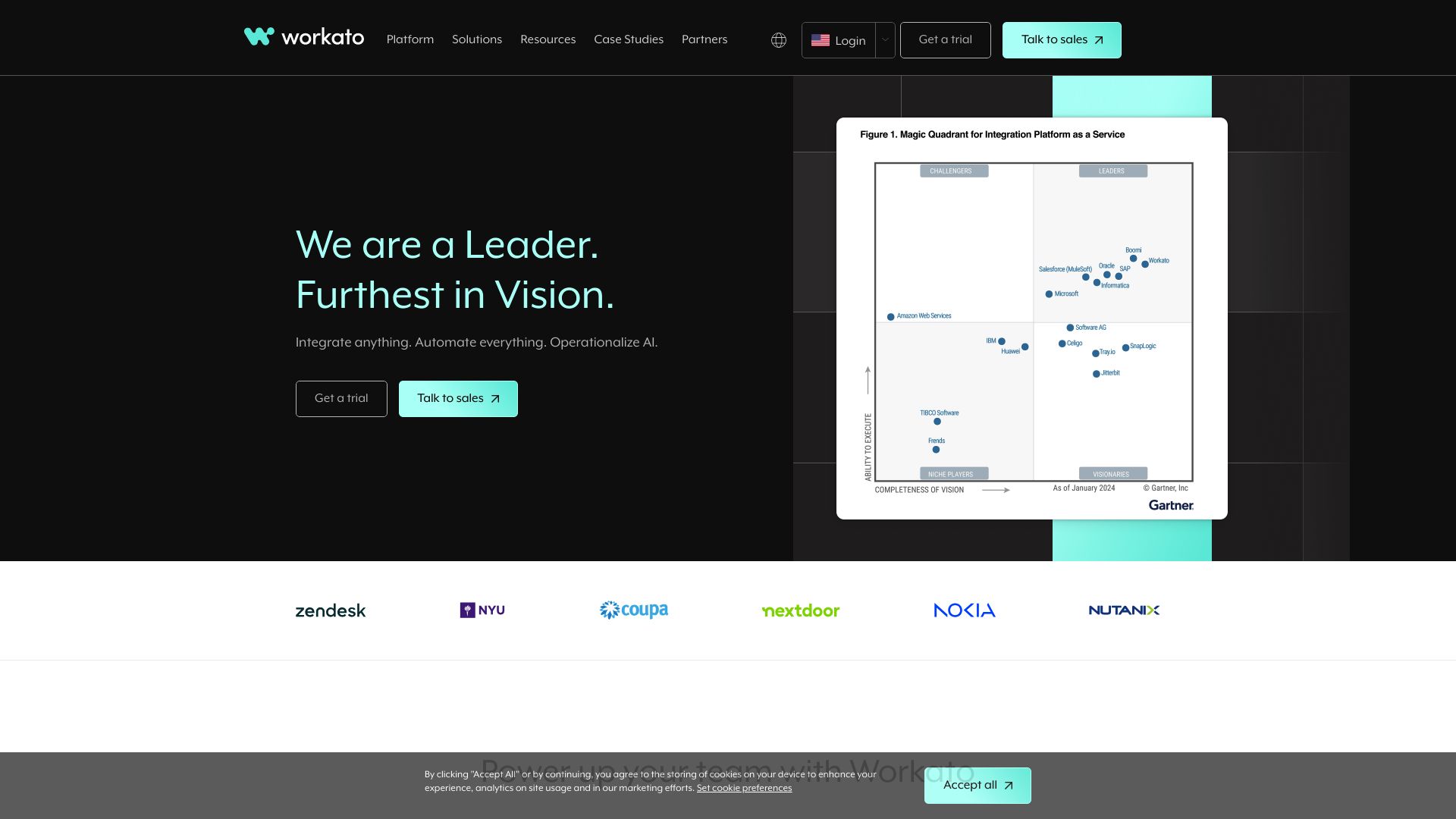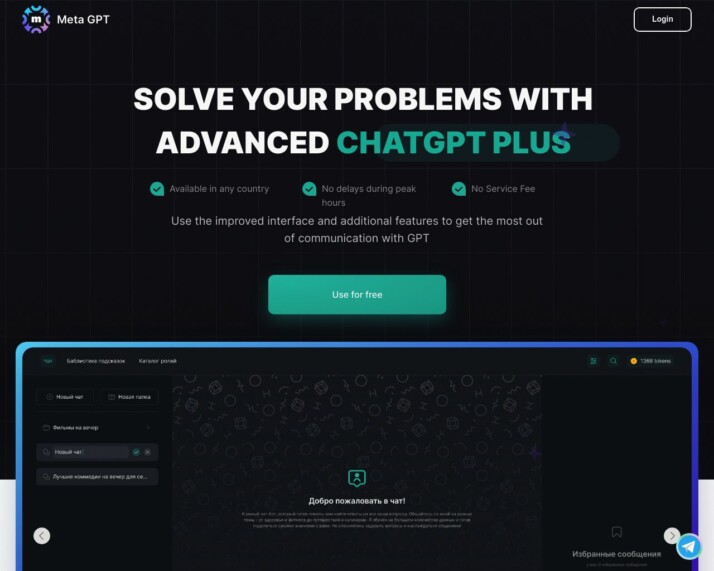Workato vs. MetaGPT: AI-Powered Automation Showdown
AI-powered platforms are revolutionizing software development and business process automation. Workato vs. MetaGPT, and SmythOS each offer unique approaches to harnessing AI’s potential. This comparison explores how these platforms empower users to create sophisticated AI agents, automate complex workflows, and drive innovation across industries.
We’ll examine their key features, strengths, and limitations to help you determine which solution best fits your organization’s needs. Whether you’re a developer seeking advanced AI capabilities, a business leader focused on enterprise-grade automation, or a non-technical professional looking for accessible tools, this guide will provide valuable insights into the cutting-edge world of AI-driven software solutions.
Workato Overview
Workato empowers businesses to automate complex workflows and integrate diverse applications without extensive coding. This enterprise-grade platform combines robust automation capabilities with artificial intelligence, enabling organizations to streamline operations and boost productivity.


Workato’s low-code/no-code interface allows both technical and non-technical users to build sophisticated automations. The platform offers over 1,500 pre-built connectors and community recipes, facilitating rapid integration across a wide array of applications and services. This extensive library enables users to quickly implement common workflows or customize solutions for specific business needs.
Workato’s low-code/no-code interface allows both technical and non-technical users to build sophisticated automations.
AI by Workato, developed in collaboration with OpenAI, enhances automation capabilities with advanced text analysis, categorization, and generation features. This AI integration enables tasks like intelligent email drafting, language translation, and data parsing. However, users should note that AI actions are subject to rate limits, which may impact high-volume use cases.
Workato’s enterprise focus shines through its robust security features, including multi-layer encryption and comprehensive audit logs. The platform’s scalable architecture supports growing businesses, while its governance framework ensures compliance with organizational policies. These features make Workato particularly attractive for large enterprises with complex automation needs and stringent security requirements.
While Workato offers powerful capabilities, its enterprise-grade features and pricing may be overkill for smaller organizations or those with simpler automation needs. Additionally, the initial learning curve can be steep for users unfamiliar with integration platforms, despite the no-code interface. Organizations should carefully evaluate their specific requirements and resources before committing to this comprehensive but potentially complex solution.
MetaGPT Overview
MetaGPT harnesses the power of multi-agent collaboration to revolutionize software development. This open-source framework combines human Standardized Operating Procedures (SOPs) with Large Language Models (LLMs) to create a virtual software company. MetaGPT assigns distinct roles to AI agents, mirroring a traditional software development team structure.


MetaGPT’s unique approach, encapsulated in the philosophy “Code = SOP(Team),” integrates established human practices into AI-driven processes. By simulating a software company’s operations, MetaGPT tackles complex development tasks with improved consistency and reliability. The framework breaks down projects into manageable subtasks, allowing specialized agents to contribute their expertise.
MetaGPT’s unique approach… integrates established human practices into AI-driven processes. By simulating a software company’s operations, MetaGPT tackles complex development tasks with improved consistency and reliability.
A standout feature of MetaGPT is its comprehensive documentation generation. Throughout the development process, it produces requirement documents, design artifacts, flowcharts, and interface specifications. These intermediate outputs enhance the final code’s quality and facilitate better human-AI collaboration.
MetaGPT aims to set a new standard in AI and multi-agent collaboration. By leveraging human-like SOPs and structured communication protocols, it expands the capabilities of AI agents to handle diverse and complex tasks across various domains. This approach not only improves multi-agent system performance but also opens up new possibilities for AI applications in real-world scenarios.
While MetaGPT offers powerful capabilities for software development, it may present a steeper learning curve for non-technical users. The framework’s focus on software engineering processes might limit its immediate applicability in other fields without adaptation. Additionally, as an open-source project, the level of support and documentation may vary, potentially requiring users to rely more on community resources for troubleshooting and best practices.
Feature Comparison
Workato and MetaGPT offer distinct approaches to AI-powered automation and development. Workato provides a comprehensive enterprise-grade platform for workflow automation and integration, while MetaGPT focuses on simulating a software development team using AI agents.
Workato excels in its extensive integration capabilities, offering over 1,500 pre-built connectors and a low-code/no-code interface. This makes it highly accessible for business users looking to automate complex workflows across multiple applications. Workato’s AI capabilities, developed in collaboration with OpenAI, enable tasks like text analysis, email drafting, and language translation within automated processes.
MetaGPT, on the other hand, takes a unique approach by assigning distinct roles to AI agents, mimicking a traditional software development team. This framework breaks down complex projects into manageable subtasks, allowing specialized agents to contribute their expertise. MetaGPT’s strength lies in its ability to generate comprehensive documentation throughout the development process, including requirement documents, design artifacts, and interface specifications.
A key difference between the two platforms is their focus on security and compliance. Workato offers robust enterprise-grade security features, including multi-layer encryption and comprehensive audit logs. MetaGPT, being an open-source framework, may require additional configuration to meet enterprise-level security standards.
While both platforms aim to simplify complex processes, they cater to different user bases. Workato’s intuitive interface and pre-built solutions make it accessible to business users without extensive technical expertise. MetaGPT’s approach may be more appealing to software development teams looking to leverage AI in their existing workflows.
In terms of deployment options, Workato offers flexibility with its cloud-based platform and support for various environments. MetaGPT’s deployment options are less clearly defined in the available information, potentially requiring more technical expertise to implement effectively.
Feature Comparison Table
| Workato | MetaGPT | SmythOS | |
|---|---|---|---|
| CORE FEATURES | |||
| Visual Builder | ✅ | ❌ | ✅ |
| No-Code Options | ✅ | ❌ | ✅ |
| Autonomous Agents | ❌ | ✅ | ✅ |
| Multimodal | ❌ | ✅ | ✅ |
| Multi-Agent Collaboration | ❌ | ✅ | ✅ |
| SECURITY | |||
| Constrained Alignment | ❌ | ✅ | ✅ |
| IP Control | ✅ | ❌ | ✅ |
| COMPONENTS | |||
| Huggingface AIs | ❌ | ✅ | ✅ |
| Zapier APIs | ❌ | ✅ | ✅ |
| Data Lakes | ❌ | ❌ | ✅ |
| DEPLOYMENT OPTIONS (EMBODIMENTS) | |||
| Staging Domains | ✅ | ❌ | ✅ |
| DATA LAKE SUPPORT | |||
| Hosted Vector Database | ❌ | ❌ | ✅ |
| Sitemap Crawler | ❌ | ❌ | ✅ |
| YouTube Transcript Crawler | ❌ | ❌ | ✅ |
| URL Crawler | ❌ | ✅ | ✅ |
Best Alternative to Workato and MetaGPT
SmythOS emerges as the superior alternative to Workato and MetaGPT, offering a comprehensive platform for AI agent development and deployment. Our solution combines the best of both worlds — enterprise-grade automation capabilities and advanced AI agent collaboration.
We provide a user-friendly visual builder that empowers both technical and non-technical users to create sophisticated AI workflows without extensive coding. This drag-and-drop interface surpasses Workato’s low-code approach and MetaGPT’s code-heavy framework, making AI development accessible to a broader audience.
SmythOS supports a wide range of use cases. Our platform enables the creation of autonomous agents that can handle complex tasks across various industries, from customer service to data analysis and beyond.
Unlike Workato’s limited AI capabilities and MetaGPT’s narrow focus on software development simulations, SmythOS supports a wide range of use cases. Our platform enables the creation of autonomous agents that can handle complex tasks across various industries, from customer service to data analysis and beyond. We offer seamless integration with popular AI models, APIs, and data sources, providing unparalleled flexibility and scalability.
Security and compliance are paramount in SmythOS. We implement robust data encryption, OAuth authentication, and IP control features, addressing the enterprise-level security concerns that MetaGPT may struggle with as an open-source framework. Our platform also offers granular permission settings and comprehensive audit logs, ensuring transparency and control over AI operations.
SmythOS stands out with its advanced deployment options. We support various embodiments, including API endpoints, webhooks, scheduled agents, and chatbots, catering to diverse business needs. Our hosted vector database and support for multiple data formats (including PDF, Word, and TXT) streamline data management and enhance AI agent performance. These features, combined with our scalable infrastructure, position SmythOS as the ideal choice for businesses seeking a powerful, versatile, and user-friendly AI agent builder.
Conclusion
Workato, MetaGPT, and SmythOS each offer unique approaches to AI-powered automation and development. Workato excels in enterprise-grade workflow automation with its extensive pre-built connectors and low-code interface. MetaGPT introduces an innovative multi-agent framework for software development, mimicking human team structures. However, SmythOS emerges as the superior choice, combining the best of both worlds and pushing the boundaries of AI agent creation and deployment.
SmythOS stands out with its intuitive drag-and-drop interface, making advanced AI functionalities accessible to users of all technical backgrounds. Unlike Workato’s enterprise focus or MetaGPT’s software development emphasis, SmythOS offers unparalleled versatility. Our platform supports a vast array of AI models, APIs, and data sources, allowing users to create sophisticated AI agents for any industry or use case.
While Workato and MetaGPT have their strengths, SmythOS takes AI agent development to the next level with features like multi-agent orchestration, versatile deployment options, and an extensive integration ecosystem. Our “Create Once, Deploy Anywhere” approach ensures that AI agents built on SmythOS can be seamlessly integrated across multiple platforms and services, offering unmatched flexibility and scalability.
Experience the future of AI agent development with SmythOS. Explore our diverse range of AI-powered agent templates to jumpstart your projects, or dive into our comprehensive documentation to unlock the full potential of our platform. Ready to revolutionize your workflow? Get started with SmythOS today and join the AI-powered revolution.
Last updated:
Disclaimer: The information presented in this article is for general informational purposes only and is provided as is. While we strive to keep the content up-to-date and accurate, we make no representations or warranties of any kind, express or implied, about the completeness, accuracy, reliability, suitability, or availability of the information contained in this article.
Any reliance you place on such information is strictly at your own risk. We reserve the right to make additions, deletions, or modifications to the contents of this article at any time without prior notice.
In no event will we be liable for any loss or damage including without limitation, indirect or consequential loss or damage, or any loss or damage whatsoever arising from loss of data, profits, or any other loss not specified herein arising out of, or in connection with, the use of this article.
Despite our best efforts, this article may contain oversights, errors, or omissions. If you notice any inaccuracies or have concerns about the content, please report them through our content feedback form. Your input helps us maintain the quality and reliability of our information.
